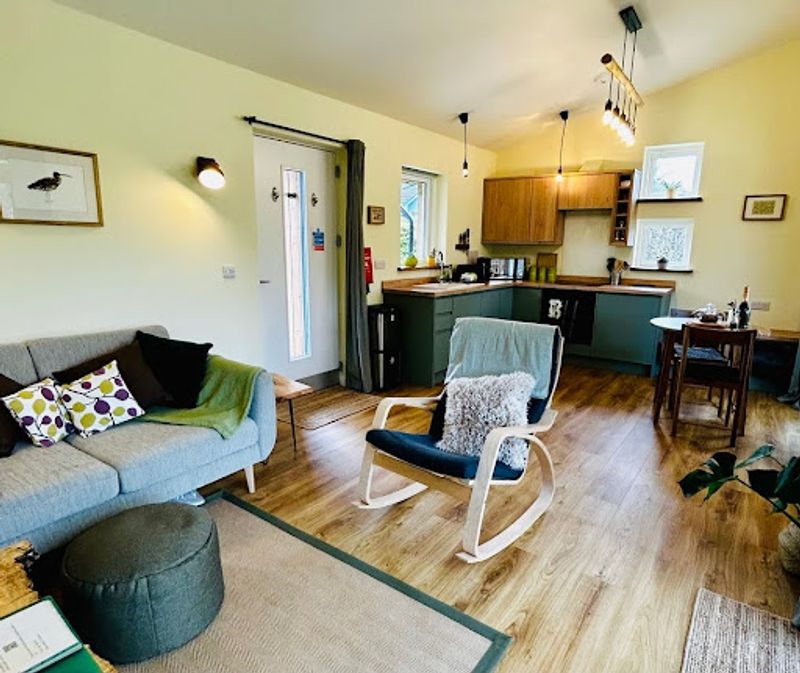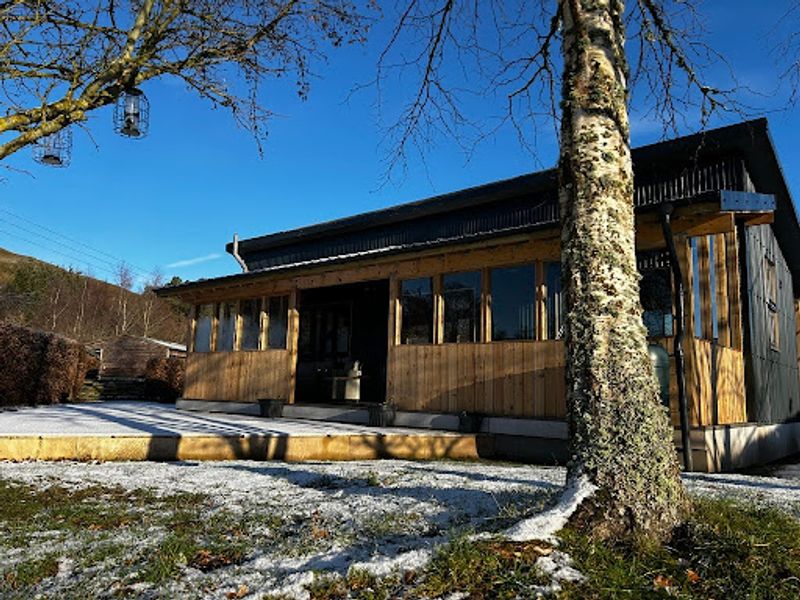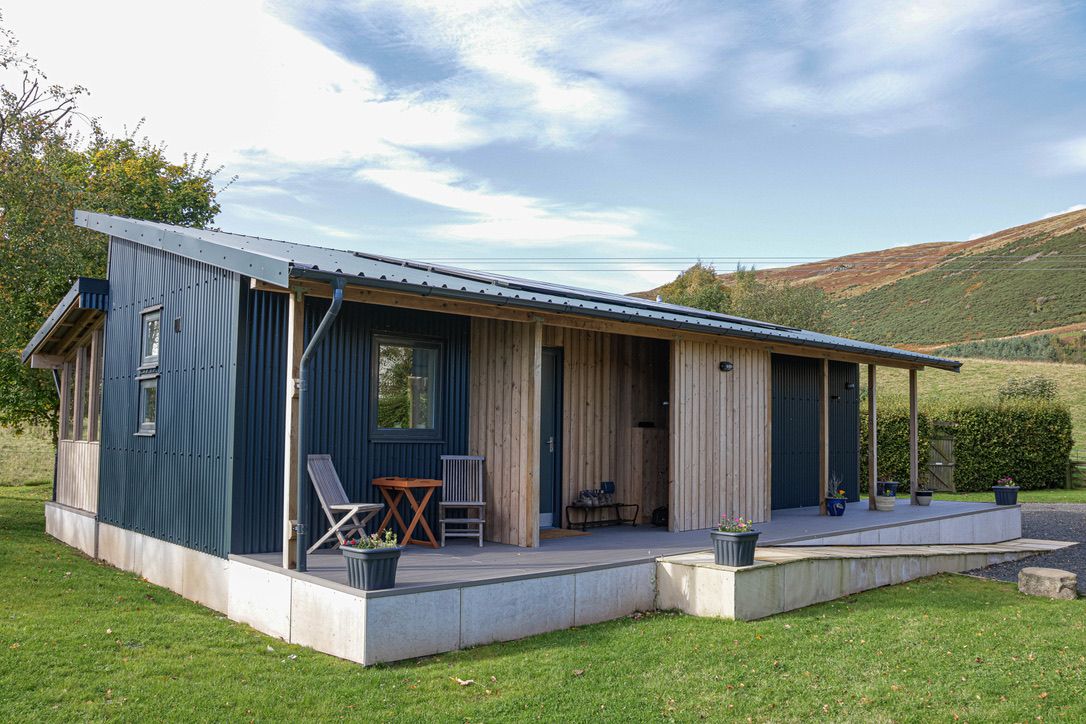Intro: Travel That Feels Good
Travel should feel good, not just for you, but for the planet too. The places you choose to sleep in can have as much impact as the flights you take or the food you eat. Whether you’re dreaming of a cosy wooden cabin in the Scottish Highlands, a luxury eco resort by the Cornish coast, or a starlit glamping spot, the right accommodation can make your holiday part of the solution to climate change rather than part of the problem. That’s the beauty of eco travel and sustainable tourism: it’s a win for you and a win for the places you visit.
What is Sustainable Accommodation?

At its core, sustainable accommodation is about minimising harm and maximising good. These are ways that protect the environment, support local communities, and preserve cultural heritage. From off-grid wooden cabins that run entirely on solar-powered energy, to log cabins with hot tubs built from reclaimed timber, the focus is on reducing the carbon footprint without sacrificing comfort. Sustainable stays are often run by locals who know the land, source food from nearby farms, and ensure that every decision, from waste disposal to water use, is made with care.
What to Look For in an Eco Stay
When browsing options online, go beyond the pretty pictures. Ask yourself: How is this place powered? Where does its water come from? Does it employ local people?
- Renewable energy: Look for properties powered by solar, wind, or geothermal energy. Many small UK eco-stays proudly share details about their systems on their websites.
- Water savings: Features like rainwater harvesting and low-flow showers aren’t just eco buzzwords; they make a huge difference in areas prone to drought.
- Waste reduction: No single-use plastics, refillable toiletries, and composting bins are all good signs.
- Local sourcing: A menu filled with farm-to-table dishes or vegetarian/vegan options usually means the hosts are committed to sustainability.
- Community support: Choosing a log cabin that’s locally owned helps keep tourism money in the community.
- Nature protection: Eco-friendly properties are often built to blend into their surroundings, using natural materials and supporting rewilding or conservation projects.
Popular Eco Options in the UK
The UK is full of unique stays that combine comfort with sustainability.
- Wooden Cabins: Perfect for nature lovers, these rustic retreats often sit deep in woodlands or near lakes. Many are family-run, using locally sourced wood and eco heating systems.
- Log Cabins with Hot Tubs: If you love a soak under the stars, search for terms like log cabin jacuzzi or log cabin with hot tub. Just make sure the property uses energy-efficient heating and responsibly sourced water.
- Glamping: From yurts to safari tents, glamping lets you be close to nature without sacrificing comfort. The best sites use compost toilets, solar lighting, and low-impact landscaping.
- Eco Resorts: A more luxurious choice, often offering spa treatments, on-site organic restaurants, and detailed annual sustainability reports.
Why Sustainable Accommodation Matters?

Every holiday choice we make leaves a footprint. A weekend away might feel harmless, but travel uses huge amounts of energy and resources, and the numbers are sobering.
- Carbon footprint: Tourism as a whole produces roughly 8% of global CO₂. Lodging alone adds about 1% (around 363 million tonnes of CO₂ per year). That means each hotel night contributes to climate change.
- Water use: Hotels are water-intensive. The World Sustainable Hospitality Alliance notes that an average hotel uses 1,500 litres of water per room per day. In some dry destinations, tourists can use over eight times more water than residents. (This strains limited supplies in drought-prone areas.) Even simple habits help: 27% of travellers already opt out of daily room cleaning to save water.
- Waste and plastics: The travel industry generates an enormous amount of trash. Globally, tourism produces around 35 million tonnes of waste per year. For example, a single 200-room hotel can use on the order of 300,000 pieces of single-use plastic every month. Much of this ends up in landfills or oceans.
- Community impacts: Over-tourism can also hurt local communities. More than half of travellers now recognise that tourism affects not just nature but people too. Locals often report negative effects like traffic, littering, and overcrowding when too many visitors arrive.
Choosing a green stay helps counter these problems. It cuts pollution, saves water, and reduces waste. In short, every smart choice, picking an eco lodge or small B&B, protects wildlife and scenery for everyone.
Recognising Sustainable Accommodation in the UK
If you're trying to find eco-friendly places to stay while travelling around the UK, it helps to know what certifications mean. These little labels can tell you a lot about how serious a hotel or guesthouse is when it comes to sustainability, from energy use to waste reduction to how they treat their staff and local communities.
Here are some of the most recognised sustainable accommodation certifications in the UK and what they stand for:
Recognising Sustainable Accommodation in the UK
Certifications help you know which places meet recognised eco standards:
- Green Tourism (GTBS) — the UK’s most well-known certification, rating businesses Bronze, Silver, or Gold.
- Green Key UK focuses on guest education and water/energy efficiency.
- EarthCheck — used by larger hotels and resorts to measure sustainability performance.
- Green Sign — a growing certification in Europe, now seen in UK properties.
- BREEAM rates the sustainability of the building itself, great for refurbished apartments.
Why Do These Certifications Matter?
It’s easy for a place to claim it’s “eco-friendly,” but these certifications prove it. They’re verified by independent organisations, so when you see one, you know the property is putting in real effort.
So next time you’re planning a UK stay, whether in a peaceful countryside retreat or a city-centre boutique hotel, keep an eye out for these certifications; they’re a good sign that your accommodation is walking the talk when it comes to sustainability.
And remember, supporting sustainable tourism isn't just about where you stay. It's about how you travel, what you eat, and the choices you make every step of the way.
Where to Book Your Eco Holiday
Finding sustainable stays has never been easier. You will find dedicated platforms that offer Eco-stays and help you travel with less or zero carbon emissions
My Eco Escape is an eco-friendly and sustainable accommodations booking platform that connects travellers seeking responsible getaways with carefully curated Eco-stays across the UK. The accommodations include glamping pods, log cabins, treehouses, and peaceful nature retreats, all hand-picked for their outstanding eco-practices and passion for sustainability. Choose your sustainable accommodation today!
There are more platforms where you can book sustainable accommodation -
- Ecobnb, Green Pearls, Nature. house -great for finding cabins and retreats immersed in nature.
- Booking.com Travel Sustainable and Airbnb Eco Collection - use these filters to find vetted eco properties.
- BookDifferent and B’n’Tree -show you the property’s carbon footprint and plant trees for each booking.
- Canopy & Stars - perfect for quirky outdoor stays like treehouses, yurts, and cabins.
How to Be a Greener Guest
Even the greenest stay can’t offset careless guest habits. Pack reusables, turn off lights, skip daily towel changes, and use public transport when possible. Shop at local markets and cafés instead of chain stores, and always leave nature as you found it. These small habits turn your eco holiday into something even more impactful.
Final Thoughts
Choosing sustainable accommodation isn’t about giving up comfort; it’s about making choices that protect the places we love. From glamping in a wildflower meadow to a wooden cabin tucked into the hills, your stay can support conservation, reduce emissions, and connect you more deeply to the destination. When you travel thoughtfully, you take home more than memories; you take pride in knowing your trip made a positive difference.
